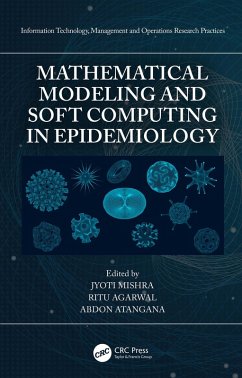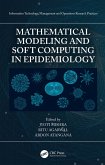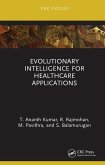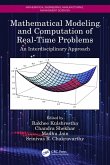Mathematical Modeling and Soft Computing in Epidemiology (eBook, ePUB)
Redaktion: Mishra, Jyoti; Atangana, Abdon; Agarwal, Ritu
59,95 €
59,95 €
inkl. MwSt.
Sofort per Download lieferbar

30 °P sammeln
59,95 €
Als Download kaufen

59,95 €
inkl. MwSt.
Sofort per Download lieferbar

30 °P sammeln
Jetzt verschenken
Alle Infos zum eBook verschenken
59,95 €
inkl. MwSt.
Sofort per Download lieferbar
Alle Infos zum eBook verschenken

30 °P sammeln
Mathematical Modeling and Soft Computing in Epidemiology (eBook, ePUB)
Redaktion: Mishra, Jyoti; Atangana, Abdon; Agarwal, Ritu
- Format: ePub
- Merkliste
- Auf die Merkliste
- Bewerten Bewerten
- Teilen
- Produkt teilen
- Produkterinnerung
- Produkterinnerung

Bitte loggen Sie sich zunächst in Ihr Kundenkonto ein oder registrieren Sie sich bei
bücher.de, um das eBook-Abo tolino select nutzen zu können.
Hier können Sie sich einloggen
Hier können Sie sich einloggen
Sie sind bereits eingeloggt. Klicken Sie auf 2. tolino select Abo, um fortzufahren.

Bitte loggen Sie sich zunächst in Ihr Kundenkonto ein oder registrieren Sie sich bei bücher.de, um das eBook-Abo tolino select nutzen zu können.
This book describes the use of different Mathematical Modeling and Soft Computing techniques used in Epidemiology for experiential research in projects such as how infectious diseases progress to show the likely outcome of an epidemic, and to contribute to public health interventions.
- Geräte: eReader
- mit Kopierschutz
- eBook Hilfe
Andere Kunden interessierten sich auch für
![Mathematical Modeling and Soft Computing in Epidemiology (eBook, PDF) Mathematical Modeling and Soft Computing in Epidemiology (eBook, PDF)]() Mathematical Modeling and Soft Computing in Epidemiology (eBook, PDF)59,95 €
Mathematical Modeling and Soft Computing in Epidemiology (eBook, PDF)59,95 €![Social Networks (eBook, ePUB) Social Networks (eBook, ePUB)]() Niyati AggrawalSocial Networks (eBook, ePUB)60,95 €
Niyati AggrawalSocial Networks (eBook, ePUB)60,95 €![Evolutionary Intelligence for Healthcare Applications (eBook, ePUB) Evolutionary Intelligence for Healthcare Applications (eBook, ePUB)]() T. Ananth KumarEvolutionary Intelligence for Healthcare Applications (eBook, ePUB)19,95 €
T. Ananth KumarEvolutionary Intelligence for Healthcare Applications (eBook, ePUB)19,95 €![Fractional Calculus in Medical and Health Science (eBook, ePUB) Fractional Calculus in Medical and Health Science (eBook, ePUB)]() Fractional Calculus in Medical and Health Science (eBook, ePUB)54,95 €
Fractional Calculus in Medical and Health Science (eBook, ePUB)54,95 €![Mathematical Modeling and Computation of Real-Time Problems (eBook, ePUB) Mathematical Modeling and Computation of Real-Time Problems (eBook, ePUB)]() Mathematical Modeling and Computation of Real-Time Problems (eBook, ePUB)51,95 €
Mathematical Modeling and Computation of Real-Time Problems (eBook, ePUB)51,95 €![Monte-Carlo Simulation (eBook, ePUB) Monte-Carlo Simulation (eBook, ePUB)]() Alan StevensMonte-Carlo Simulation (eBook, ePUB)47,95 €
Alan StevensMonte-Carlo Simulation (eBook, ePUB)47,95 €![Engineering Mathematics and Artificial Intelligence (eBook, ePUB) Engineering Mathematics and Artificial Intelligence (eBook, ePUB)]() Engineering Mathematics and Artificial Intelligence (eBook, ePUB)64,95 €
Engineering Mathematics and Artificial Intelligence (eBook, ePUB)64,95 €-
-
-
This book describes the use of different Mathematical Modeling and Soft Computing techniques used in Epidemiology for experiential research in projects such as how infectious diseases progress to show the likely outcome of an epidemic, and to contribute to public health interventions.
Hinweis: Dieser Artikel kann nur an eine deutsche Lieferadresse ausgeliefert werden.
Dieser Download kann aus rechtlichen Gründen nur mit Rechnungsadresse in A, B, BG, CY, CZ, D, DK, EW, E, FIN, F, GR, HR, H, IRL, I, LT, L, LR, M, NL, PL, P, R, S, SLO, SK ausgeliefert werden.
Hinweis: Dieser Artikel kann nur an eine deutsche Lieferadresse ausgeliefert werden.
Produktdetails
- Produktdetails
- Verlag: Taylor & Francis eBooks
- Seitenzahl: 440
- Erscheinungstermin: 28. Dezember 2020
- Englisch
- ISBN-13: 9781000226980
- Artikelnr.: 60661300
- Verlag: Taylor & Francis eBooks
- Seitenzahl: 440
- Erscheinungstermin: 28. Dezember 2020
- Englisch
- ISBN-13: 9781000226980
- Artikelnr.: 60661300
- Herstellerkennzeichnung Die Herstellerinformationen sind derzeit nicht verfügbar.
Dr. Jyoti Mishra is currently an Assistant Professor at Dept.of Mathematics, Gyan Ganga Institute of Technology and Sciences, Jabalpur. She is a qualified individual with around 10 years of expertise in Teaching, R&D with specialization in Mathematics. She is B.Sc., M.Sc &,B.Ed She received her Ph.D. degree in Special function from APS University, Rewa, India. Her research interests include Special function. Fractional Calculus, Partial differential Equations, special function, Mathematical Modeling. Been a part of various seminars, paper presentations, research paper reviews, conferences as co-convener, Member of Organizing Committee, Member of Advisory Committee, Member of Technical Committee and contribution in organizing INSPIRE Science Internship Camp. She has published more than 25 research papers in reputed journals and authored 3 books. She has been actively involved in professional bodies Indian Mathematical Society, IAPS, FATER. She is reviewer in many sci journals, IEEE international conferences, CSNT-2015, CICN-2016, CICN2017, INDIACom-2019, ICICC-CONF 2019 and many more. She is published 05 patents in Intellectual Property, India. Dr Ritu Agarwal has done Ph.D., M. phil, M Sc, JRF-NET. She is Assistant Professor of mathematics in Malaviya National Institute of Technology, Jaipur. She is having 15 years of teaching and research experience. Her areas of research include Biocomplex analysis, Geometric function theory, mathematical modelling and fractional calculus. She has published 45 research papers in journals of repute. Under her guidance 2 Ph.D. completed. Awarded a research project by NBHM. Attended 12 international conference. She has organized various events like short-term courses, FDP, Conferences of national and international level. She has been actively involved with professional bodies Indian Mathematical Society, IAENG, ISTE, ISCA, FIM, IACSIT, RMS, SSFA, VIJNANA, Gwalior Academy of Sciences, TIMC, IEEE. She has 11 text books for BE/B. Tech to her credit and has supervised approx 20 M.sc. dissertations. Dr. Abdon Atangana received Ph.D degree from University of free state South Africa. He is Prof. of applied mathematics Institute for Groundwater Studies,University of the Free State. He has Awarded of the youngest leading international researcher in fractional Calculus intheyear2019 ,Obada award 2018, African Academic of Science, Affiliate 2018-2022Most cited mathematics paper in the world ,2017,African Award of applied Mathematics 2017. He isthe number 1 top overall contributor to the peer review of the field of mathematics. The sentinel of science awards honoring the elite contributors to scholar peer review and editorial pursuits internationally. Recipients have demonstrated an outstanding expert commitment to protecting the integrity and accuracy of published research in their field in the year 2017 .He has received many best researcher award in different university .In the field of Applied Mathematics he has introduced the more than fifteen mathematical operators and numerical schemes that nowadays used in all fields of science, technology and engineering. He published approx 250 sci papers in different reputed journals and H- index 36, citation is 5148.
1. Evolutionary Modelling of Dengue Fever with Incubation Period of Virus
2. Fuzzy-Genetic Approach to Epidemiology
3. Role of Mathematical Models in Physiology and Pathology
4. Machine-Learned Regression Assessment of the HIV Epidemiological
Development in Asian Region
5. Mathematical Modeling to Find the Potential Number of Ways to Distribute
Certain Things to Certain Places in Medical Field
6. Fractional SIRI Model with Delay in Context of the Generalized
Liouville-Caputo Fractional Derivative
7. Optimal Control of a Nipah Virus Transmission Model
8. Application of Eternal Domination in Epidemiology
9. Numerical Analysis of Coupled Time-Fractional Differential Equations
Arising in Epidemiological Models
10. Balancing of Nitrogen Mass Cycle for Healthy Living Using Mathematical
Model
11. Neutralizing of Nitrogen when the Changes of Nitrogen Content Is Rapid
12. Application of Blockchain Technology in Hospital Information System
13. Complexity Analysis of Pathogenesis of Coronavirus Epidemiology Spread
in the China Region
14. A Mathematical Fractional Model to Study the Hepatitis B Virus
Infection
15. Nonlinear Dynamics of SARS-CoV2 Virus: India and Its Government Policy
16. Ethical and Professional Issues in Epidemiology
17. Cloud Virtual Image Security for Medical Data Processing
18. Medical Data Security Using Blockchain and Machine Learning Techniques
in Cloud Computing
19. Mathematical Model to Avoid Delay Wound Healing by Infinite Element
Method
20. Data Classification Framework for Medical Data through Machine Learning
Techniques in Cloud Computing
Index
2. Fuzzy-Genetic Approach to Epidemiology
3. Role of Mathematical Models in Physiology and Pathology
4. Machine-Learned Regression Assessment of the HIV Epidemiological
Development in Asian Region
5. Mathematical Modeling to Find the Potential Number of Ways to Distribute
Certain Things to Certain Places in Medical Field
6. Fractional SIRI Model with Delay in Context of the Generalized
Liouville-Caputo Fractional Derivative
7. Optimal Control of a Nipah Virus Transmission Model
8. Application of Eternal Domination in Epidemiology
9. Numerical Analysis of Coupled Time-Fractional Differential Equations
Arising in Epidemiological Models
10. Balancing of Nitrogen Mass Cycle for Healthy Living Using Mathematical
Model
11. Neutralizing of Nitrogen when the Changes of Nitrogen Content Is Rapid
12. Application of Blockchain Technology in Hospital Information System
13. Complexity Analysis of Pathogenesis of Coronavirus Epidemiology Spread
in the China Region
14. A Mathematical Fractional Model to Study the Hepatitis B Virus
Infection
15. Nonlinear Dynamics of SARS-CoV2 Virus: India and Its Government Policy
16. Ethical and Professional Issues in Epidemiology
17. Cloud Virtual Image Security for Medical Data Processing
18. Medical Data Security Using Blockchain and Machine Learning Techniques
in Cloud Computing
19. Mathematical Model to Avoid Delay Wound Healing by Infinite Element
Method
20. Data Classification Framework for Medical Data through Machine Learning
Techniques in Cloud Computing
Index
1. Evolutionary Modelling of Dengue Fever with Incubation Period of Virus
2. Fuzzy-Genetic Approach to Epidemiology
3. Role of Mathematical Models in Physiology and Pathology
4. Machine-Learned Regression Assessment of the HIV Epidemiological
Development in Asian Region
5. Mathematical Modeling to Find the Potential Number of Ways to Distribute
Certain Things to Certain Places in Medical Field
6. Fractional SIRI Model with Delay in Context of the Generalized
Liouville-Caputo Fractional Derivative
7. Optimal Control of a Nipah Virus Transmission Model
8. Application of Eternal Domination in Epidemiology
9. Numerical Analysis of Coupled Time-Fractional Differential Equations
Arising in Epidemiological Models
10. Balancing of Nitrogen Mass Cycle for Healthy Living Using Mathematical
Model
11. Neutralizing of Nitrogen when the Changes of Nitrogen Content Is Rapid
12. Application of Blockchain Technology in Hospital Information System
13. Complexity Analysis of Pathogenesis of Coronavirus Epidemiology Spread
in the China Region
14. A Mathematical Fractional Model to Study the Hepatitis B Virus
Infection
15. Nonlinear Dynamics of SARS-CoV2 Virus: India and Its Government Policy
16. Ethical and Professional Issues in Epidemiology
17. Cloud Virtual Image Security for Medical Data Processing
18. Medical Data Security Using Blockchain and Machine Learning Techniques
in Cloud Computing
19. Mathematical Model to Avoid Delay Wound Healing by Infinite Element
Method
20. Data Classification Framework for Medical Data through Machine Learning
Techniques in Cloud Computing
Index
2. Fuzzy-Genetic Approach to Epidemiology
3. Role of Mathematical Models in Physiology and Pathology
4. Machine-Learned Regression Assessment of the HIV Epidemiological
Development in Asian Region
5. Mathematical Modeling to Find the Potential Number of Ways to Distribute
Certain Things to Certain Places in Medical Field
6. Fractional SIRI Model with Delay in Context of the Generalized
Liouville-Caputo Fractional Derivative
7. Optimal Control of a Nipah Virus Transmission Model
8. Application of Eternal Domination in Epidemiology
9. Numerical Analysis of Coupled Time-Fractional Differential Equations
Arising in Epidemiological Models
10. Balancing of Nitrogen Mass Cycle for Healthy Living Using Mathematical
Model
11. Neutralizing of Nitrogen when the Changes of Nitrogen Content Is Rapid
12. Application of Blockchain Technology in Hospital Information System
13. Complexity Analysis of Pathogenesis of Coronavirus Epidemiology Spread
in the China Region
14. A Mathematical Fractional Model to Study the Hepatitis B Virus
Infection
15. Nonlinear Dynamics of SARS-CoV2 Virus: India and Its Government Policy
16. Ethical and Professional Issues in Epidemiology
17. Cloud Virtual Image Security for Medical Data Processing
18. Medical Data Security Using Blockchain and Machine Learning Techniques
in Cloud Computing
19. Mathematical Model to Avoid Delay Wound Healing by Infinite Element
Method
20. Data Classification Framework for Medical Data through Machine Learning
Techniques in Cloud Computing
Index







